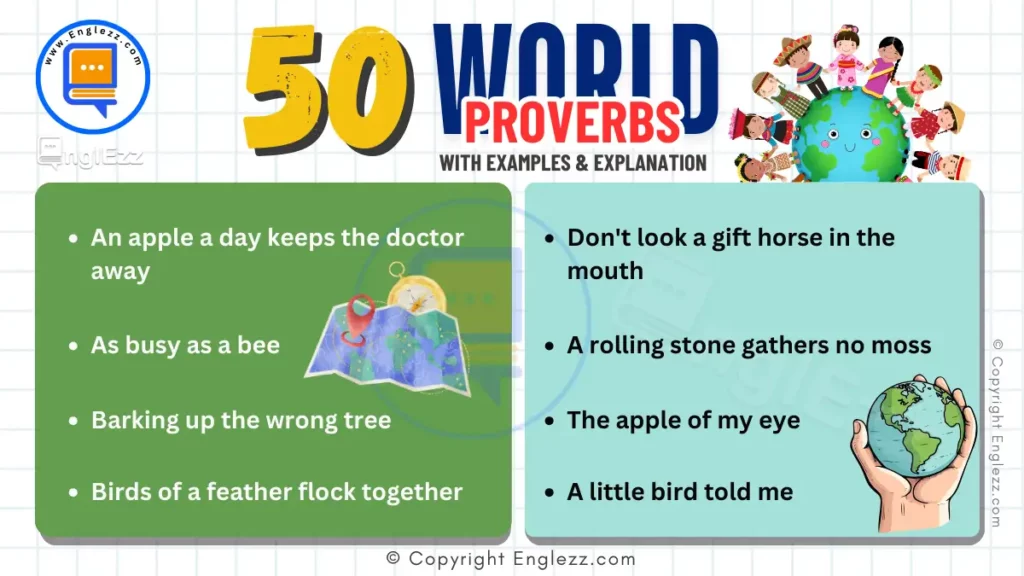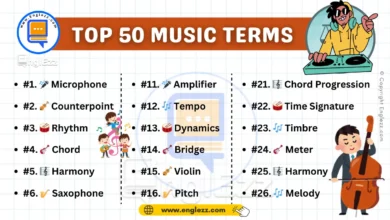Proverbs are the distilled wisdom of generations, offering profound insights into human nature, life’s challenges, and universal truths. These succinct sayings transcend cultural boundaries, resonating with people across the globe. In this comprehensive guide, we’ll explore 50 famous proverbs in English for easy understanding.
Each proverb is a window into the values, beliefs, and experiences of different cultures. By examining these sayings, we not only broaden our linguistic horizons but also gain valuable life lessons that have stood the test of time. From ancient Chinese wisdom to African tribal knowledge, and from Latin American insights to European traditional sayings, this collection represents a diverse tapestry of human thought.
Top 50 Famous Proverbs from Around the World in English
As we delve into each proverb, we’ll provide the original version in its native language, along with a phonetic transcription to help you pronounce it. We’ll explain the meaning behind each saying and offer two practical examples of how these proverbs can be applied in everyday situations. Whether you’re a language enthusiast, a cultural explorer, or simply someone seeking timeless wisdom, this guide offers a rich resource of global knowledge at your fingertips.
Let’s embark on this journey through the world’s wisdom, one proverb at a time.
#1. 🌟 A journey of a thousand miles begins with a single step
Original (Chinese): 千里之行,始於足下 Phonetic: Qiānlǐ zhī xíng, shǐyú zú xià
Explanation: This famous Chinese proverb emphasizes the importance of taking the first step in any significant endeavor. It reminds us that even the most daunting tasks or long-term goals can be achieved by simply beginning and making consistent progress.
Examples:
- Sarah had always dreamed of writing a novel but felt overwhelmed by the task. Remembering the proverb, she decided to start by writing just one page a day.
- When faced with the challenge of losing 50 pounds, Tom applied this wisdom by making small, daily changes to his diet and exercise routine instead of attempting drastic measures.
#2. 🌳 The apple doesn’t fall far from the tree
Original (German): Der Apfel fällt nicht weit vom Stamm Phonetic: Der Apfel felt nicht vite fom Shtam
Explanation: This proverb suggests that children often resemble their parents in behavior, characteristics, or traits. It implies that our upbringing and genetics significantly influence who we become.
Examples:
- When Lisa’s daughter showed a natural talent for music, just like her mother, her grandmother smiled and said, “The apple doesn’t fall far from the tree.”
- As Mark watched his son confidently give a speech at school, he realized that his own public speaking skills had indeed been passed down, proving that the apple doesn’t fall far from the tree.
#3. 🐦 A bird in the hand is worth two in the bush
Original (Latin): Avis in manu melior est quam duae in silva Phonetic: Ah-vis in mah-noo meh-lee-or est kwam doo-eye in sil-vah
Explanation: This proverb teaches us that it’s better to have a smaller but certain advantage than the possibility of a greater one that may not materialize. It encourages valuing what we already possess over uncertain prospects.
Examples:
- When offered a stable job with a modest salary versus the chance of a higher-paying position that wasn’t guaranteed, Emily chose the former, remembering that a bird in the hand is worth two in the bush.
- Instead of risking his life savings on a speculative investment, Peter decided to keep his money in a low-yield but secure savings account, applying the wisdom that a bird in the hand is worth two in the bush.
#4. 🌊 A drop in the ocean
Original (Russian): Капля в море Phonetic: Kaplya v more
Explanation: This proverb suggests that something is insignificant in comparison to the whole. It’s often used to describe a small action or contribution that seems minimal in the face of a much larger issue or situation.
Examples:
- Though John’s $10 donation to the disaster relief fund felt like a drop in the ocean, he knew that every contribution would help.
- The company’s small reduction in plastic use was a drop in the ocean compared to global pollution, but it was a start towards more sustainable practices.
#5. 🐺 A wolf in sheep’s clothing
Original (Latin): Lupus in vestimentis ovium Phonetic: Loo-pus in ves-ti-men-tis o-vi-um
Explanation: This proverb describes someone or something that appears harmless or friendly but is actually dangerous or malicious. It warns against being deceived by appearances.
Examples:
- The charming salesman turned out to be a wolf in sheep’s clothing when he scammed several elderly customers out of their savings.
- Sarah thought her new friend was kind, but she was actually a wolf in sheep’s clothing who spread rumors behind Sarah’s back.
#6. 🧠 Absence makes the heart grow fonder
Original (Latin): Absentia facit cor amantius Phonetic: Ab-sen-tia fa-kit kor a-man-ti-us
Explanation: This proverb suggests that when people are apart, their affection for each other increases. It implies that separation can strengthen bonds and increase appreciation for someone.
Examples:
- After a month-long business trip, Tom realized that absence really does make the heart grow fonder as he couldn’t wait to see his family again.
- During their year of long-distance dating, Maria and Peter found that absence made their hearts grow fonder, strengthening their relationship despite the challenges.
#7. 🍎 An apple a day keeps the doctor away
Original (Welsh): Afal y dydd yn cadw’r doctor i ffwrdd Phonetic: Aval uh deeth un kadoo’r doctor ee fwarth
Explanation: This proverb emphasizes the importance of maintaining good health through regular, simple habits. While it specifically mentions apples, it generally promotes the idea that a healthy diet can prevent illness.
Examples:
- Remembering the old saying “an apple a day keeps the doctor away,” Lisa made sure to include fresh fruits in her daily diet.
- The school’s new health program used the “apple a day” proverb as a catchy slogan to encourage students to make healthier food choices.
#8. 🐝 As busy as a bee
Original (English): As busy as a bee
Explanation: This proverb compares a person’s industriousness to that of a bee, known for its constant work in pollinating flowers and producing honey. It describes someone who is very active and hardworking.
Examples:
- During exam season, Sarah was as busy as a bee, constantly moving between studying, attending review sessions, and completing assignments.
- The event planner was as busy as a bee in the days leading up to the wedding, coordinating vendors, finalizing details, and ensuring everything was perfect.
#9. 🌳 Barking up the wrong tree
Original (English): Barking up the wrong tree
Explanation: This proverb means to pursue a mistaken or misguided line of thought or course of action. It originates from the image of a dog barking at the base of a tree where it wrongly believes its quarry is hiding.
Examples:
- When the detective accused the wrong person of the crime, his colleague told him he was barking up the wrong tree and should reconsider the evidence.
- The marketing team was barking up the wrong tree with their new campaign, completely misunderstanding their target audience’s preferences.
#10. 🐦 Birds of a feather flock together
Original (Latin): Similis similem quaerit Phonetic: Si-mi-lis si-mi-lem kwe-rit
Explanation: This proverb suggests that people with similar interests, backgrounds, or characteristics tend to associate with each other. It often describes how like-minded individuals or those with shared traits gravitate towards one another.
Examples:
- At the international food festival, Maria noticed how birds of a feather flock together as people from different countries naturally grouped around their native cuisine stalls.
- The high school chess club was a perfect example of how birds of a feather flock together, bringing together students who shared a passion for strategic thinking.
#11. 🧠 Don’t count your chickens before they hatch
Original (Latin): Noli confidere in ovo ante diem crastinum Phonetic: No-lee kon-fee-de-re in o-vo an-te dee-em kras-tee-num
Explanation: This proverb advises against anticipating success or making plans based on future events that are not certain. It encourages caution and realism in expectations.
Examples:
- The startup founder was careful not to count his chickens before they hatched, refusing to spend money until the investors’ checks had cleared.
- Sarah didn’t count her chickens before they hatched and waited until she received the official job offer before telling her friends about the new position.
#12. 🐘 Elephant in the room
Original (English): Elephant in the room
Explanation: This modern proverb refers to an obvious problem or difficult situation that people do not want to talk about, even though it affects everyone involved.
Examples:
- The family gathering was tense as everyone avoided mentioning the elephant in the room – Dad’s recent job loss.
- During the board meeting, the company’s declining sales figures were the elephant in the room that no one wanted to address directly.
#13. 🍎 Every cloud has a silver lining
Original (English): Every cloud has a silver lining
Explanation: This proverb suggests that in every bad situation, there is some good aspect to be found. It encourages optimism and looking for positive aspects even in difficult times.
Examples:
- After losing his job, Tom realized that every cloud has a silver lining when he found a better position that allowed him to spend more time with his family.
- The cancelled flight was initially disappointing, but Sarah saw that every cloud has a silver lining when she met her future business partner at the airport.
#14. 🐟 Give a man a fish and you feed him for a day; teach a man to fish and you feed him for a lifetime
Original (Chinese): 授人以鱼不如授人以渔 Phonetic: Shòu rén yǐ yú bùrú shòu rén yǐ yú
Explanation: This proverb emphasizes the importance of teaching skills rather than simply providing temporary solutions. It promotes self-sufficiency and long-term problem-solving.
Examples:
- The charity organization shifted its focus from food donations to job training programs, embodying the principle of teaching a man to fish rather than giving him a fish.
- Instead of solving her son’s math problems for him, Maria showed him how to approach similar questions, remembering that teaching him to fish would serve him better in the long run.
#15. 🧊 The tip of the iceberg
Original (English): The tip of the iceberg
Explanation: This proverb suggests that a visible or known part of a problem is only a small part of a much larger issue. It comes from the fact that only a small part of an iceberg is visible above water.
Examples:
- The few complaints the company received were just the tip of the iceberg; a thorough investigation revealed widespread dissatisfaction among customers.
- The arrest of one corrupt official turned out to be just the tip of the iceberg in a massive government scandal.
#16. 🍋 When life gives you lemons, make lemonade
Original (English): When life gives you lemons, make lemonade
Explanation: This proverb encourages optimism and a can-do attitude in the face of adversity or misfortune. It suggests turning negative situations into positive ones.
Examples:
- After her small business failed, Sarah decided to make lemonade out of lemons by using her experience to become a consultant for other entrepreneurs.
- When the outdoor wedding was rained out, the couple made lemonade from lemons by turning it into a cozy, intimate indoor celebration.
#17. 🐎 Don’t look a gift horse in the mouth
Original (Latin): Noli equi dentes inspicere donati Phonetic: No-lee e-kwee den-tes in-spi-ke-re do-na-tee
Explanation: This proverb advises against finding fault with or criticizing something that has been received as a gift or favor. It originates from the practice of examining a horse’s teeth to determine its age and value.
Examples:
- When his uncle offered him a used car for free, John decided not to look a gift horse in the mouth and accepted it gratefully, despite its old model.
- Although the volunteer’s work wasn’t perfect, the charity organizer reminded her team not to look a gift horse in the mouth and to appreciate the free help.
#18. 🪨 A rolling stone gathers no moss
Original (Latin): Saxum volutum non obducitur musco Phonetic: Sak-sum vo-lu-tum non ob-du-ki-tur mus-ko
Explanation: This proverb can have two interpretations: it can mean that people who don’t settle in one place will not accumulate wealth or responsibilities, or alternatively, that movement and change prevent stagnation.
Examples:
- John’s frequent job changes meant he was a rolling stone gathering no moss, which gave him diverse experiences but less financial stability.
- The company encouraged its employees to be rolling stones by rotating them through different departments, preventing stagnation and promoting innovation.

#19. 🌳 The apple of my eye
Original (Old English): Æppel min eages Phonetic: Ap-pel min ee-yes
Explanation: This phrase is used to describe someone who is cherished above all others. It originated from the belief that the pupil of the eye was a solid apple-shaped object.
Examples:
- Grandpa always said his youngest granddaughter was the apple of his eye, showering her with affection and attention.
- Despite having three dogs, the little pug was clearly the apple of Sarah’s eye, always getting extra treats and cuddles.
#20. 🐦 A little bird told me
Original (English): A little bird told me
Explanation: This idiom is used when you don’t want to reveal the source of some information, often implying that the information was obtained through gossip or secret means.
Examples:
- When asked how she knew about the surprise party, Jane simply smiled and said, “A little bird told me.”
- The manager confronted the team about the project delays, saying, “A little bird told me that we’re falling behind schedule.”
#21. 🎭 All that glitters is not gold
Original (Italian): Non è tutto oro quel che luce Phonetic: Non eh tut-to o-ro kwel ke lu-che
Explanation: This proverb warns that appearances can be deceiving. Not everything that looks precious or valuable on the surface is actually so.
Examples:
- The high-paying job offer seemed perfect, but Sarah soon realized that all that glitters is not gold when she discovered the toxic work environment.
- Many tourists learn that all that glitters is not gold when they visit overhyped attractions that don’t live up to their expectations.
#22. 🌳 The grass is always greener on the other side
Original (Latin): Fertilior seges est alienis semper in agris Phonetic: Fer-ti-li-or se-ges est a-li-e-nis sem-per in a-gris
Explanation: This proverb suggests that people often think others have it better than they do, even when it’s not true. It cautions against discontentment with one’s own situation.
Examples:
- After switching jobs three times in a year, Tom realized the grass isn’t always greener on the other side and learned to appreciate his current position.
- Social media often makes people feel like the grass is always greener on the other side, but reality is usually quite different from these curated online representations.
#23. 🐘 An elephant never forgets
Original (English): An elephant never forgets
Explanation: This proverb highlights the excellent memory of elephants, metaphorically used to describe people who have a particularly good memory or who hold grudges for a long time.
Examples:
- Like an elephant that never forgets, Grandma could recall every detail of her childhood, even at 90 years old.
- Be careful what you say to John; he’s like an elephant that never forgets, and he might bring it up years later.
#24. 🍎 One bad apple spoils the whole barrel
Original (English): One bad apple spoils the whole barrel
Explanation: This proverb suggests that one corrupt or bad person can have a negative influence on an entire group, potentially ruining the whole.
Examples:
- The teacher had to address the disruptive student quickly, knowing that one bad apple could spoil the whole barrel and affect the entire class’s learning environment.
- The company swiftly dealt with the unethical employee, understanding that one bad apple could spoil the whole barrel and damage their reputation.
#25. 🐦 A bird in the hand is worth two in the bush
Original (English): A bird in the hand is worth two in the bush
Explanation: This proverb suggests that it’s better to have a lesser but certain advantage than the possibility of a greater one that may not materialize.
Examples:
- Sarah decided to accept the job offer she had rather than wait for a potentially better one, remembering that a bird in the hand is worth two in the bush.
- Instead of risking his savings on a speculative investment, Tom chose a more modest but guaranteed return, knowing that a bird in the hand is worth two in the bush.
#26. 🌊 Don’t make waves
Original (English): Don’t make waves
Explanation: This proverb advises against causing trouble or disturbing a calm situation. It suggests maintaining the status quo rather than creating disturbances.
Examples:
- Although he disagreed with the decision, Tom decided not to make waves at the meeting and went along with the majority.
- The new employee was advised not to make waves during her first few months and to observe the company culture before suggesting changes.
#27. 🐘 The elephant in the room
Original (English): The elephant in the room
Explanation: This modern proverb refers to an obvious problem or difficult situation that people do not want to talk about, even though it affects everyone involved.
Examples:
- The couple’s financial troubles were the elephant in the room during their anniversary dinner, unspoken but affecting the entire evening.
- Climate change was the elephant in the room at the economic forum, with speakers avoiding the topic despite its significant impact on global markets.
#28. 🍎 An apple a day keeps the doctor away
Original (Welsh): Afal y dydd yn cadw’r doctor i ffwrdd Phonetic: A-val uh deeth un ka-doo’r dok-tor ee fwarth
Explanation: This proverb emphasizes the importance of maintaining good health through regular, simple habits. While it specifically mentions apples, it generally promotes the idea that a healthy diet can prevent illness.
Examples:
- Sarah started including an apple in her daily lunch, joking that she was keeping the doctor away one fruit at a time.
- The school’s new health initiative used the “apple a day” proverb as its slogan to encourage students to make healthier food choices.
#29. 🌳 Money doesn’t grow on trees
Original (English): Money doesn’t grow on trees
Explanation: This proverb is used to teach the value of money and the importance of responsible spending. It emphasizes that money is a limited resource that must be earned.
Examples:
- When his son asked for an expensive new gadget, Dad reminded him that money doesn’t grow on trees and encouraged him to save up for it.
- The financial advisor began her seminar by reminding attendees that money doesn’t grow on trees, emphasizing the importance of budgeting and saving.
#30. 🐟 There are other fish in the sea
Original (English): There are other fish in the sea
Explanation: This proverb is often used to console someone after a romantic disappointment, suggesting that there are many other potential partners available.
Examples:
- After Sarah’s breakup, her friends reminded her that there are other fish in the sea and encouraged her to stay positive.
- When Tom didn’t get the job he wanted, his mentor told him not to worry, as there are other fish in the sea, meaning other opportunities would come along.
#31. 🌊 Still waters run deep
Original (Latin): Altissima quaeque flumina minimo sono labi Phonetic: Al-tis-si-ma kwe-kwe flu-mi-na mi-ni-mo so-no la-bi
Explanation: This proverb suggests that a calm or quiet exterior often conceals great depth of character, knowledge, or emotion.
Examples:
- Though quiet in meetings, Sarah’s insights always proved that still waters run deep, impressing her colleagues with her thoughtful contributions.
- Don’t underestimate the shy new student; remember, still waters run deep, and he might surprise you with his knowledge.
#32. 🐺 Cry wolf
Original (English): Cry wolf
Explanation: This phrase comes from Aesop’s fable and means to raise false alarms, leading others to disbelieve you when a real crisis occurs.
Examples:
- The IT department warned employees not to cry wolf with system issues, as it could lead to real emergencies being ignored.
- After several false alarms, the neighbors stopped responding when the teenager cried wolf about intruders in his yard.
#33. 🍎 The forbidden fruit is always the sweetest
Original (Latin): Nitimur in vetitum semper cupimusque negata Phonetic: Ni-ti-mur in ve-ti-tum sem-per ku-pi-mus-kwe ne-ga-ta
Explanation: This proverb suggests that things that are prohibited or off-limits often seem more desirable.
Examples:
- Despite the “Do Not Touch” sign, visitors were drawn to the sculpture, proving that the forbidden fruit is always the sweetest.
- The exclusive club’s popularity soared, demonstrating that the forbidden fruit is always the sweetest in social circles.
#34. 🐘 Have a memory like an elephant
Original (English): Have a memory like an elephant
Explanation: This phrase describes someone with an exceptionally good memory, referencing the belief that elephants never forget.
Examples:
- Grandma has a memory like an elephant, recalling details from events decades ago with perfect clarity.
- The history professor’s ability to remember dates and facts showed he truly had a memory like an elephant.
#35. 🌳 Can’t see the forest for the trees
Original (German): Den Wald vor lauter Bäumen nicht sehen Phonetic: Den Vald for lau-ter Boy-men nicht ze-hen
Explanation: This proverb means to be so focused on small details that one fails to understand the bigger picture or overall situation.
Examples:
- The project manager reminded the team not to can’t see the forest for the trees and to focus on the main objectives rather than minor issues.
- Sometimes, parents can’t see the forest for the trees when it comes to their children’s behavior, missing larger patterns while focusing on individual incidents.
#36. 🐦 A little bird told me
Original (English): A little bird told me
Explanation: This idiom is used when you don’t want to reveal the source of some information, often implying that the information was obtained through gossip or secret means.
Examples:
- When asked how she knew about the surprise party, Jane simply smiled and said, “A little bird told me.”
- The manager confronted the team about the project delays, saying, “A little bird told me that we’re falling behind schedule.”
#37. 🌊 Go with the flow
Original (Latin): Flumini obsequi Phonetic: Flu-mi-ni ob-se-kwi
Explanation: This phrase advises adapting to or accepting a situation, rather than resisting it.
Examples:
- When the vacation plans changed unexpectedly, Sarah decided to go with the flow and enjoy the new itinerary.
- To succeed in the fast-paced startup environment, new employees were advised to go with the flow and be flexible.
#38. 🐘 The elephant in the room
Original (English): The elephant in the room
Explanation: This modern proverb refers to an obvious problem or difficult situation that people do not want to talk about, even though it affects everyone involved.
Examples:
- The company’s financial troubles were the elephant in the room during the annual meeting, with everyone avoiding the topic.
- The family gathering was tense as everyone ignored the elephant in the room – Dad’s recent job loss.
#39. 🍎 One rotten apple spoils the barrel
Original (English): One rotten apple spoils the barrel
Explanation: This proverb suggests that one corrupt or bad person can have a negative influence on an entire group, potentially ruining the whole.
Examples:
- The coach had to remove the troublemaker from the team, knowing that one rotten apple spoils the barrel and could affect team morale.
- The company quickly addressed the unethical behavior of one employee to prevent one rotten apple from spoiling the barrel of their corporate culture.
#40. 🌳 Money doesn’t grow on trees
Original (English): Money doesn’t grow on trees
Explanation: This proverb is used to teach the value of money and the importance of responsible spending. It emphasizes that money is a limited resource that must be earned.
Examples:
- When his daughter asked for an expensive new phone, Dad reminded her that money doesn’t grow on trees and suggested she save her allowance.
- The financial literacy class began with the instructor reminding students that money doesn’t grow on trees, emphasizing the importance of budgeting and saving.
#41. 🐟 There are plenty of fish in the sea
Original (English): There are plenty of fish in the sea
Explanation: This proverb is often used to console someone after a romantic disappointment, suggesting that there are many other potential partners available.
Examples:
- After Lisa’s breakup, her sister reminded her that there are plenty of fish in the sea and encouraged her to stay positive.
- When Mark didn’t get a callback for his dream job, his mentor assured him that there are plenty of fish in the sea, meaning other great opportunities would come along.
#42. 🧠 Two heads are better than one
Original (Latin): Plus vident oculi quam oculus Phonetic: Plus vi-dent o-ku-li kwam o-ku-lus
Explanation: This proverb suggests that collaboration often yields better results than working alone, as different perspectives can lead to better problem-solving.
Examples:
- The complex project was solved more quickly when the team decided that two heads are better than one and worked together.
- Sarah and Tom always studied together for exams, believing that two heads are better than one when it comes to understanding difficult concepts.
#43. 🐺 A wolf in sheep’s clothing
Original (Latin): Lupus in vestimentis ovium Phonetic: Lu-pus in ves-ti-men-tis o-vi-um
Explanation: This proverb describes someone or something that appears harmless or friendly but is actually dangerous or malicious.
Examples:
- The seemingly helpful financial advisor turned out to be a wolf in sheep’s clothing, scamming clients out of their life savings.
- The new colleague appeared friendly, but was actually a wolf in sheep’s clothing, taking credit for others’ work behind their backs.
#44. 🌊 Don’t make waves
Original (English): Don’t make waves
Explanation: This proverb advises against causing trouble or disturbing a calm situation. It suggests maintaining the status quo rather than creating disturbances.
Examples:
- Even though he disagreed with the decision, John decided not to make waves at the meeting and went along with the majority.
- The new employee was advised not to make waves during her first few months and to observe the company culture before suggesting changes.
#45. 🐘 The memory of an elephant
Original (English): The memory of an elephant
Explanation: This phrase describes someone with an exceptionally good memory, referencing the belief that elephants never forget.
Examples:
- My history professor has the memory of an elephant, able to recall obscure dates and facts from centuries ago.
- Be careful what you promise to Sarah; she has the memory of an elephant and will remember even the smallest details.
#46. 🌳 The apple doesn’t fall far from the tree
Original (German): Der Apfel fällt nicht weit vom Stamm Phonetic: Der Ap-fel felt nicht vite fom Shtam
Explanation: This proverb suggests that children often resemble their parents in behavior or traits.
Examples:
- When Lisa’s daughter showed a natural talent for music, just like her mother, her grandmother remarked, “The apple doesn’t fall far from the tree.”
- Watching his son effortlessly charm the room, John realized the apple doesn’t fall far from the tree, recognizing his own social skills in his child.
#47. 🐦 Kill two birds with one stone
Original (Latin): Duos parietes de eadem fidelia dealbare Phonetic: Du-os pa-ri-e-tes de e-a-dem fi-de-li-a de-al-ba-re
Explanation: This proverb means to accomplish two tasks with a single action.
Examples:
- By carpooling to work, Sarah managed to kill two birds with one stone: saving money on gas and reducing her carbon footprint.
- The multi-purpose furniture allowed the small apartment dweller to kill two birds with one stone, creating both a workspace and extra storage.
#48. 🍎 An apple a day keeps the doctor away
Original (Welsh): Afal y dydd yn cadw’r doctor i ffwrdd Phonetic: A-val uh deeth un ka-doo’r dok-tor ee fwarth
Explanation: This proverb emphasizes the importance of maintaining good health through regular, simple habits.
Examples:
- Tom started including an apple in his daily lunch, joking that he was keeping the doctor away one fruit at a time.
- The school’s new health initiative used the “apple a day” proverb as its slogan to encourage students to make healthier food choices.
#49. 🌊 A drop in the ocean
Original (Russian): Капля в море Phonetic: Kap-lya v mo-re
Explanation: This proverb suggests that something is insignificant in comparison to the whole.
Examples:
- The small donation felt like a drop in the ocean compared to the millions needed for the charity project, but every contribution helped.
- Reducing plastic use in one household may seem like a drop in the ocean, but collectively, these small actions can make a significant impact.
#50. 🧠 Knowledge is power
Original (Latin): Scientia potentia est Phonetic: Ski-en-ti-a po-ten-ti-a est
Explanation: This proverb emphasizes the importance of knowledge and education as tools for success and influence.
Examples:
- The library’s new campaign used the slogan “Knowledge is power” to encourage more people to take advantage of their resources.
- Sarah’s dedication to continuous learning proved that knowledge is power when she leveraged her expertise to secure a promotion.
Proverbs from Around the World in English Table
Here’s a table of the 20 translated proverbs in English:
| 1. A journey of a thousand miles begins with a single step | 11. Don’t count your chickens before they hatch |
| 2. The apple doesn’t fall far from the tree | 12. Elephant in the room |
| 3. A bird in the hand is worth two in the bush | 13. Every cloud has a silver lining |
| 4. A drop in the ocean | 14. Give a man a fish and you feed him for a day; teach a man to fish and you feed him for a lifetime |
| 5. A wolf in sheep’s clothing | 15. The tip of the iceberg |
| 6. Absence makes the heart grow fonder | 16. When life gives you lemons, make lemonade |
| 7. An apple a day keeps the doctor away | 17. Don’t look a gift horse in the mouth |
| 8. As busy as a bee | 18. A rolling stone gathers no moss |
| 9. Barking up the wrong tree | 19. The apple of my eye |
| 10. Birds of a feather flock together | 20. A little bird told me |
Proverbs from Around the World in English Printable

Conclusion
These 50 proverbs from around the world offer a glimpse into the collective wisdom of diverse cultures. They encapsulate universal truths about human nature, life’s challenges, and the keys to success and happiness. From cautionary tales to motivational mantras, these sayings have stood the test of time, proving their relevance across generations and geographical boundaries.
As we’ve explored these proverbs, we’ve seen how they can be applied to modern situations, demonstrating their timeless nature. Whether it’s the reminder that “the grass isn’t always greener on the other side” or the encouragement that “every cloud has a silver lining,” these nuggets of wisdom provide guidance, comfort, and perspective in our daily lives.
By understanding and applying these proverbs, we can gain insights into different cultures, improve our communication skills, and perhaps most importantly, navigate life’s complexities with a bit more wisdom. They remind us of our shared human experiences and the universal truths that connect us all, regardless of our backgrounds.
As you reflect on these proverbs, consider how they might apply to your own life. Which ones resonate with you the most? How might you use them to gain perspective on your challenges or to inspire positive change? Remember, the true power of these proverbs lies not just in knowing them, but in living them.









🌍✨ Unlock the wisdom of the world with these 50 universal proverbs!
Whether you’re a language enthusiast or just looking for some sage advice, this post has something for everyone. Don’t miss out on this linguistic journey – follow and like EnglEzz for more global language gems! 🌟👍🧠💡 Dive into a treasure trove of cultural insights and life lessons at
.
https://lnkd.in/dkd3MmMj
#englezz #languagelearning #culturalwisdom #proverbs #globalinsights #lifelessons #linguisticjourney